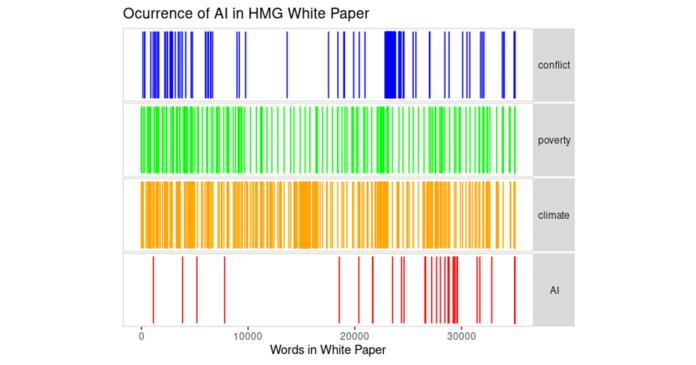AI in International Development: does the UK's White Paper underestimate its significance?
Discover insights as our Data Innovation team compares AI mentions with other key topics in the UK Gov’s White Paper, revealing untapped potential for AI in global development.
-
Date
December 2023
-
Area of expertiseResearch and Evidence (R&E)
-
KeywordData Innovation
The recently released White Paper on International Development by the UK Government presents a comprehensive overview of the UK’s approach to global development. While the paper rightly emphasises the importance of innovation and digital transformation in driving progress, it fails to adequately pay attention to and address the transformative potential of artificial intelligence (AI) in addressing global challenges.
Despite the UK's position as a global leader in AI research and development, the White Paper seems to relegate AI to passing mentions, making limited references to its potential applications in various sectors including education, healthcare, facilitation of de-mining and disaster prediction.
The paper's treatment of AI is particularly underwhelming when compared to the attention given to other key topics. A simple keyword analysis reveals a significant disparity in the frequency with which AI is mentioned compared to other concepts. This suggests that, despite good intentions, the paper may not fully appreciate the potentially transformative potential of AI and its ability to significantly affect development efforts.

Notable gaps
The White Paper's limited discussion of AI misses several critical areas where AI could play a pivotal role in international development. For instance, AI can be utilised to:
- Tackle poverty: AI-powered algorithms can analyse poverty data to identify trends and patterns, enabling the development of targeted poverty reduction programmes. Additionally, AI can support financial inclusion initiatives by facilitating access to digital banking and financial services.
- Address climate change: AI can play a crucial role in mitigating and adapting to the impacts of climate change. AI-powered tools can optimise energy consumption, develop renewable energy solutions, and improve climate modelling and prediction. Engaging with these efforts is crucial to ensure that AI is a net positive factor in combating climate change rather than a net negative driver of greenhouse gas emissions.
- Enhance healthcare: AI could help revolutionise healthcare delivery by providing personalised medical diagnoses, facilitating remote patient monitoring, and supporting drug discovery and development.
- Improve education: AI can personalise learning experiences, provide adaptive instruction, and automate tasks, making education more accessible and effective for all.
Unpacking the potential
To fully capitalise on the potential of AI for international development, the UK Government should consider implementing the following recommendations:
- Establish a dedicated AI for Development Unit: This unit would focus on identifying and supporting AI-powered solutions to development challenges, providing a central hub for AI expertise and innovation in development.
- Invest in AI capacity building in LMICs: This includes training and education programmes, research and development partnerships, and infrastructure development initiatives to enhance local AI capabilities in low- and middle-income countries (LMICs).
- Promote ethical AI development and deployment: Develop guidelines and frameworks to ensure AI is used responsibly and ethically in development contexts, addressing potential concerns regarding bias, privacy, and transparency.
- Foster collaboration and knowledge sharing: Encourage collaboration among AI researchers, development practitioners, and policymakers to share knowledge and best practices, leveraging the UK's strong AI sector to lead these efforts.
The UK Government's upcoming flagship AI programme at the Foreign, Commonwealth and Development Office (FCDO) presents an opportunity to address the gaps in the White Paper and comprehensively integrate AI into the UK's international development strategy. By adopting a more holistic approach to AI, the UK can make a significant contribution to leveraging AI's transformative power for advancing global development and addressing the world's most pressing challenges.

